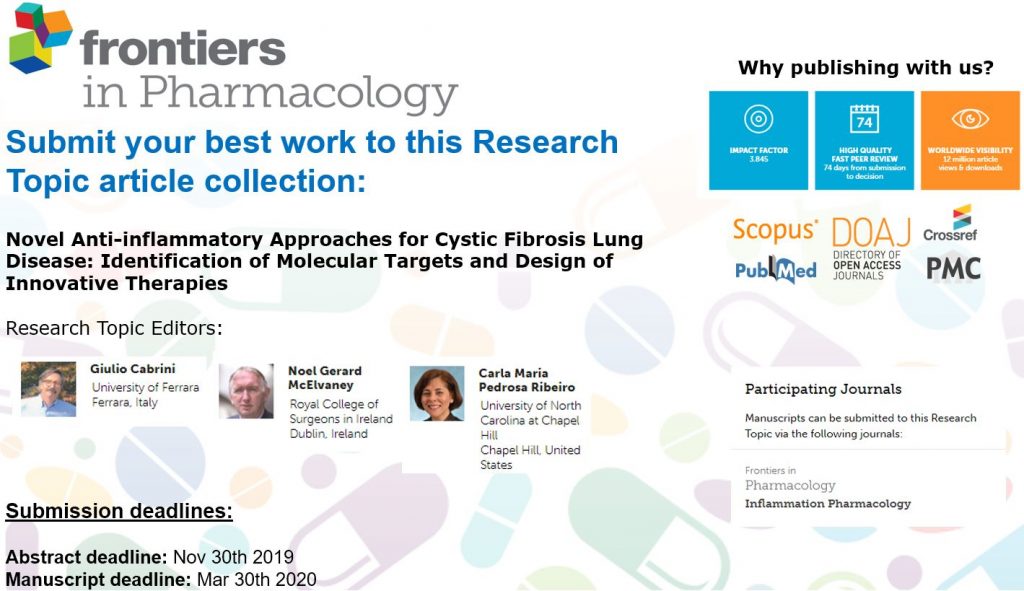Together with Giulio Cabrini and Noel Gerard McElvaney, Carla Ribeiro is serving as an Editor for Frontiers in Pharmacology‘s Research Topic titled “Novel Anti-inflammatory Approaches for Cystic Fibrosis Lung Disease: Identification of Molecular Targets and Design of Innovative Therapies.” The journal is inviting manuscripts related to this topic, with an abstract deadline of November 30, 2019, and a manuscript deadline of March 30, 2019. More information about the research topic can be found below.
(Click image to enlarge)
About This Research Topic:
The genetic defect of the Cystic Fibrosis (CF) Transmembrane Conductance Regulator (CFTR) ion channel promotes dehydration of the airway surface liquid, alters mucus properties, and decreases mucociliary clearance, favoring the onset of recurrent and, ultimately, chronic bacterial infection. The immune response of CF lungs is characterized by exaggerated inflammation, abundant pro-inflammatory cytokines and chemokines in the bronchial mucosa, massive lumenal infiltrates of polymorphonuclear neutrophils-releasing proteases, and reactive oxygen species, which lead to chronic airway obstruction and damage.
The contribution of cellular components (e.g., bronchial epithelial cells, neutrophils, lymphocytes, macrophages, dendritic cells), subcellular organelles (e.g. endoplasmic reticulum, mitochondria), intracellular signalling pathways (e.g. MAP kinases, calcium signaling, the unfolded protein response) and transcription factors (e.g. NF-kB and XBP-1) has been investigated regarding the pathophysiology of the exaggerated CF lung inflammation. The relevance of infection concerning host-pathogen interactions and the role of mutant CFTR protein in this complex interplay have also been explored. However, the identification of key druggable molecular targets remains an unmet need that requires further research.
Although corticosteroids and ibuprofen have shown limited efficacy in CF patients, the development of novel anti-inflammatory drugs for CF lung inflammation has been neglected for many years. Instead, drug discovery efforts aimed at correcting the trafficking and function of mutated CFTR became a priority. Nevertheless, it remains to be established whether CFTR modulators will be sufficient to halt the inflammatory processes responsible for lung damage in CF adolescents and adults with advanced lung disease. In addition, it is not known whether CFTR modulators will prevent the establishment of lung pathology when administered to CF infants exhibiting early signs of pulmonary disease.
Clinical trials investigating new CFTR modulators are suggesting that novel anti-inflammatory therapies are still necessary to improve respiratory prognosis in CF patients. Moreover, little is known regarding whether the persistent lung inflammatory process affects the effectiveness of novel drugs aimed to rescue the defective CFTR function.
This Research Topic aims to assemble articles focusing on CF lung inflammation, specifically on novel molecular targets and on innovative pharmacological approaches and drugs. We welcome the submission of Reviews, Mini-Reviews, Original Research articles to cover, but not limited to, the following topics:
- Novel molecular targets to control CF lung inflammation
- Impact of inflammation on the rescue of mutant CFTR by novel CFTR modulators
- Consequences of novel CFTR modulator therapies for inflammatory responses, mucus rheology and airway clearance
- Development of CF-tailored new anti-inflammatory molecules
- Drug repositioning approaches towards CF lung inflammation
- Monitoring response to anti-inflammatory interventions in CF
Keywords: Cystic fibrosis, lung inflammation, inflammation, CFTR
